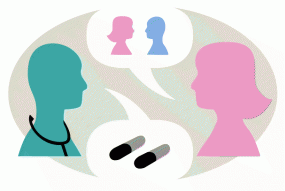Just Diagnosed? Next Steps After Testing Positive for Gonorrhea or Chlamydia

If you’ve just found out that you have gonorrhea or chlamydia, you may be trying to figure out what to do next. Here are the three most important steps that you can take:
1. Get Treated
WHY?
Many people with gonorrhea and chlamydia don’t have symptoms. Why does this matter? Because an untreated infection can lead to serious and permanent health problems, even if you never have symptoms. Gonorrhea and chlamydia can be cured with the right medicine from your doctor. Just make sure you take all of your medicine exactly as your doctor tells you to.
WHERE?
Your regular doctor can prescribe antibiotics to cure the STD. But if you don’t have insurance or want to see someone else for treatment, there are other low-cost or free options. You can get tested and treated at your local health department’s STD clinic, a family planning clinic, a student health center, or an urgent care clinic. You can also find a clinic using GetTested and ask if they offer treatment for gonorrhea and chlamydia.
What can happen if I don’t get treated for chlamydia or gonorrhea?
- In women, untreated chlamydia or gonorrhea can cause pelvic inflammatory disease (PID) which can lead to health problems like ectopic pregnancy (pregnancy outside the womb) or infertility (unable to get pregnant).
- In men, chlamydia and gonorrhea can each cause a painful condition in the tubes attached to the testicles. In rare cases, this may prevent him from being able to have children.
- Untreated chlamydia or gonorrhea may also increase your chances of getting or giving HIV – the virus that causes AIDS.
2. Tell Your Partner
WHY?
Your partner may also be infected and not know it and needs to get tested and treated. Left untreated, chlamydia and gonorrhea can cause serious health problems like PID, infertility, and potential deadly ectopic pregnancy. Also, without treatment, your partner may pass the STD back to you.
HOW?
It may be emotionally uncomfortable, but telling your partners about STDs allows them to protect their health, too. Being diagnosed with an STD can cause many strong emotions. You may begin to question your trust in your partner or be worried that they will question their trust in you. Before you blame anyone, know that STDs are common and don’t always cause symptoms. It is possible that you or your partner got the STD in a previous relationship without even knowing it. Keeping that in mind, talk to your partner as soon as possible. Be honest and straightforward.
During and after your talk, your partner may also have many strong emotions. The most helpful thing you can do is listen to your partner’s concerns and fears and offer information about the STD and its symptoms and treatment. Give your partner time to absorb this information. Help your partner understand that they may also have the STD. Sometimes, no one knows for sure who had the infection first.
If you’re looking for tips on how to start the conversation with your partner, here are some resources that can help get you talking:
- Conversation Starters from the Start Talking. Stop HIV. campaign – CDC’s Division of HIV/AIDS Prevention
- Talk to Your Partner – STDs & Testing (GYT)
- Telling Your Partner You Have an STD – TeensHealth
WHERE?

Just like you, your partner needs to receive medical care as soon as possible. There are a number of places and ways that your partner can get medicine for gonorrhea or chlamydia:
- You can bring your partner to the clinic you went to.
- You can tell your partner to go to the clinic you went to. Your partner should tell clinic staff which infection you were diagnosed with. Sharing this information will help your partner get the correct tests and treatment.
- You may be able to get a prescription or medicine for both you and your partner from the clinic or from your doctor. This is called expedited partner therapy (EPT).
- Your partner can go to their own doctor or clinic (such as the local health department’s STD clinic, a family planning clinic, a student health center, or an urgent care clinic).
3. Get Retested
WHY?
It’s common to get infected with gonorrhea and chlamydia again. Even if you and your partner took medicine, you should be retested in 3 months.
A good way to remember is to set a notification on your phone or email, ask your doctor’s office or clinic to remind you, or scribble a note on your calendar—whatever you need to do to make sure you stay healthy!
- Page last reviewed: August 1, 2017
- Page last updated: August 1, 2017
- Content source:


 ShareCompartir
ShareCompartir